EDF is committed to restarting all its reactors this winter. The French government has declared its intention to have 56 reactors in operation this winter.
Unprecedented breakdowns
Currently, 32 of the 56 reactors are shut down. In fact, they had been affected by corrosion problems and had to be put back into service as soon as possible. EDF had also announced that it would be forced to extend the shutdown of 4 of them. Reactors 1, 3 and 4 at Cattenom and Reactor 1 at Penly will not be reconnected to the grid until between November and January.
These 4 reactors of 1.3 GW cause a loss of production of more than 5 TWh for the winter period.
These problems had been noticed as a result of routine inspections at the Civeaux nuclear power plant in October 2021. Stress corrosion cracking problems had been identified. This led to a program of inspections and repairs to assess the extent of the problem.
These outages have added to the spike in energy prices with risk premiums for electricity. As a result, some monthly contracts exceeded €2,000/MWh on August 26.
This situation in conjunction with the war in Ukraine is of concern. In fact, it is causing very strong tensions on the European energy markets and France is no exception. Rising prices and the risk of energy shortages are a central issue at present.
EDF will restart its reactors
The government is heavily involved in restarting the failed reactors. In addition, he emphasizes the commitment made by EDF, which claims to restart all its reactors by this winter. Thus, the French government says it wants to be vigilant to ensure that these objectives are met.
According to EDF, nine reactors should be back in service in September. An additional 19 units are expected to follow the same process in the fourth quarter.
Nuclear production in France has fallen by 37% over one year. High river water temperatures also contributed to the reduction in power in some units.
However, Platts Analytics predicts an increase in average French production in the future. Thus, it will increase from about 24 GW to an average generation of 43.8 GW in December.






















